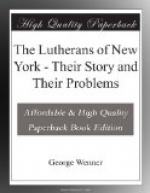Lutherans have their place in Church History. Our doctrinal principles differ in certain respects from those of other churches. We believe that these principles are an expression of historical, evangelical Christianity, worthy of being promulgated, not in a spirit of arrogant denominationalism, but in a spirit of toleration and catholicity. Yet few in this city, outside of our own kith and kin, understand the meaning of our system. We have made but little progress in commending it to others or in extending our denominational lines.
We do not even hold the ground that belongs to us. The descendants of the Lutherans of the first two centuries are not enrolled in our church books. Although of late years we have increased a hundredfold (literally a hundredfold within the memory of men still living), we are far from caring effectively for our flocks. The number of lapsed Lutherans is larger than that of the enrolled members of our churches. In the language of our Palatine forefathers: Doh is ebbes letz.
While therefore recent progress affords ground for encouragement, it is not a time for boastfulness. It is rather a time for self-examination, for an inquiry into our preparedness for new tasks and impending opportunities.
We are living in an imperial city. What we plan and what we do here in New York projects itself far beyond the walls of our city. Nowhere are the questions of the community more complicated and the needs of the time more urgent than here. We should therefore ask ourselves whether the disjointed sections of our church, arrayed during the Quadricentennial as one, for the purposes of a spectacular celebration, but each exalting some particularism of secondary value, adequately represent the religious ideas which four centuries ago gave a new impulse to the life of the world. If not, where does the trouble lie? Is it a question of doctrine, of language, of organization or of spirit?
The emphasis we place upon doctrine has given us a reputation for exclusiveness. The author believes that the spirit of Lutheranism is that of catholicity. He holds that, in our relations with the people of this city and with other churches we ought to emphasize the essential and outstanding features of the Lutheran Church rather than the minute distinctions which only the trained dogmatician can comprehend. He is in sympathy with the well known plea of Rupertus Meldenius, an otherwise unknown Lutheran theologian of the seventeenth century (about 1623), to observe “in essentials unity, in non-essentials liberty, in all things charity.”




